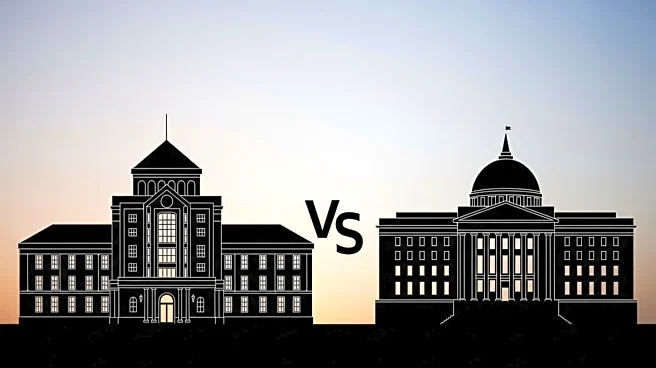What is the story about?
What's Happening?
Dr. Sally Kornbluth, the President of the Massachusetts Institute of Technology (MIT), has declined a funding proposal from President Trump. The proposal, known as the 'Compact for Academic Excellence in Higher Education,' offered 'priority' funding to MIT in exchange for implementing certain policy changes. This decision marks MIT as the first academic institution to reject the proposal. Dr. Kornbluth's decision was made public during her testimony before the House Education and Workforce Committee on December 5, 2023, in Washington, DC. The committee was investigating antisemitism on college campuses, a context that may have influenced MIT's decision to reject the funding offer.
Why It's Important?
The rejection of President Trump's funding proposal by MIT is significant as it highlights the institution's commitment to maintaining its policy independence and academic integrity. This decision could set a precedent for other universities facing similar offers, emphasizing the importance of academic freedom over financial incentives. The move may also impact the relationship between higher education institutions and government funding, potentially leading to broader discussions on the influence of political agendas in academic settings. Stakeholders in the education sector, including faculty, students, and policymakers, may view this as a pivotal moment in preserving the autonomy of educational institutions.
What's Next?
Following MIT's rejection, other universities may evaluate their stance on similar funding proposals, potentially leading to a wave of rejections or acceptance based on their institutional values. The decision could prompt further scrutiny of government funding offers and their implications for academic policies. Additionally, the House Education and Workforce Committee's investigation into antisemitism on campuses may continue to influence discussions around funding and policy decisions in higher education. Stakeholders, including university leaders and policymakers, may engage in dialogues to address the balance between financial support and policy autonomy.
Beyond the Headlines
MIT's decision to reject the funding proposal may have deeper implications for the ethical standards in academia. It raises questions about the extent to which financial incentives should influence educational policies and the potential risks of compromising academic integrity for monetary gain. This development could lead to long-term shifts in how universities approach government funding and policy changes, fostering a culture of transparency and ethical decision-making in higher education.















